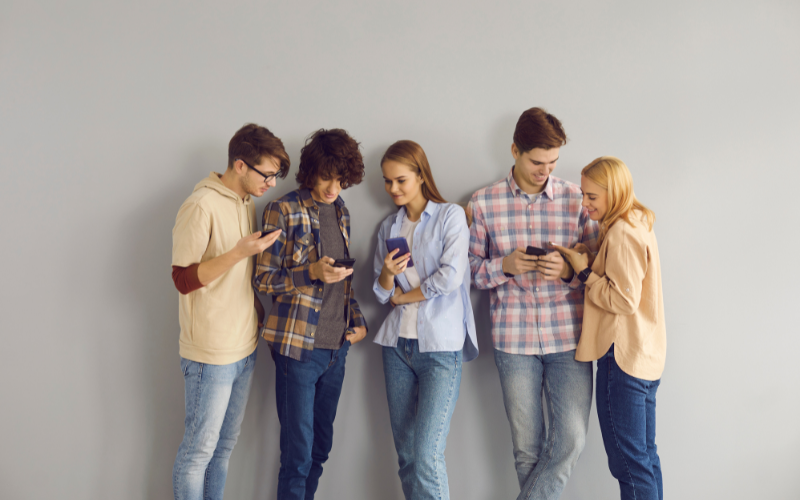Should I be Worried About My Teen and Social Media?
In our current era, where digital connectivity reigns supreme, social media has become integral to daily interactions, particularly for adolescents.
For GenZ, growing up in a digital-first environment, social media is crucial to their social and emotional development. While these platforms offer opportunities for self-expression, community building, and educational pursuits, they also present significant challenges to adolescent mental health. These challenges range from self-esteem issues and body image concerns to more severe implications like anxiety, depression, and exposure to cyberbullying.
How Does Social Media Psychologically Impact Teens?
Adolescence is a crucial time for brain development, making teens particularly susceptible to the influences of their environment – social media being a predominant aspect. The instant feedback loop of likes, comments, and shares on social media platforms significantly influences how teens perceive themselves and interact with their peers.
This digital interaction can create a sense of validation or rejection, heavily impacting their mental state. Additionally, the constant availability of these platforms can lead to overuse, affecting sleep patterns, attention spans, and academic performance. Understanding these psychological effects is essential for guiding teens toward healthier social media habits.
What is the Impact of Social Media on Teen Self-Esteem?
With their curated content and idealized portrayals of life, social media platforms can create unrealistic benchmarks for teens. Regular exposure to such content can lead teens to engage in detrimental comparisons with their peers, often feeling that their own lives, appearances, or achievements are inadequate.
This constant comparison can erode self-esteem and amplify feelings of loneliness and depression. Acknowledging and addressing the impact of these platforms on teen self-image is crucial for fostering a positive and realistic digital environment.
How Can I Protect My Teen from Cyberbullying?
In the realm of social media, cyberbullying represents a pervasive and often overlooked threat to adolescent well-being. Unlike traditional bullying, cyberbullying can occur at any time and place, making it a relentless issue for victims. The anonymity afforded by the internet can lead to more severe forms of harassment and bullying.
Teens facing cyberbullying often suffer from a range of emotional and psychological issues, including lowered self-esteem, academic difficulties, social isolation, and, in extreme cases, self-harm or suicidal thoughts. Addressing this issue requires comprehensive strategies that involve parents, educators, and policy-makers, along with stricter enforcement of community standards by social media platforms.
When Should I Be Worried About My Teen’s Social Media Use?
Navigating the digital age can be challenging for parents, especially when it comes to their teens’ social media and phone use. It’s normal for teenagers to spend time online, but some signs might indicate a problem. Excessive use can be a red flag, especially if it interferes with sleep, school, or face-to-face interactions. If your teen becomes withdrawn, secretive about their online activities, or shows signs of mood swings, anxiety, or depression linked to their digital interactions, it’s time to take a closer look.
Another concern is the type of content they are engaging with. Exposure to harmful or inappropriate material can have significant impacts on a teen’s mental health and worldview. Parents should also be alert to changes in behavior after using social media, like increased agitation or sadness.
Maintaining open communication with your teen about their online world is important. Encourage healthy digital habits and boundaries, and model balanced online behavior yourself. If concerns persist, consider consulting with a mental health professional who can provide guidance tailored to your teen’s needs. Remember, intervention at the right time can make a big difference in your teen’s well-being.
How Can We Balance Social Media’s Impact on Teen Mental Health?
The impact of social media on adolescent mental health is a complex and multifaceted issue. It presents both challenges and opportunities, requiring a nuanced understanding of its effects. While social media can contribute to issues like low self-esteem, cyberbullying, and FOMO, it also offers valuable opportunities for connection, expression, and education. Striking a balance in how teens engage with social media is key to maximizing its benefits while minimizing its drawbacks.
How Can Lumos Psychiatric Help?
If you’re dealing with teen mental health issues, Lumos Clinical Research Center is here to provide expert guidance and support.
Contact us to learn more and receive the help you need. We’re committed to assisting teens in finding a balance that promotes mental and emotional well-being, enabling them to thrive at a complicated time in their lives. Our welcoming facilities are located in San Jose, CA, and Los Gatos, CA.

